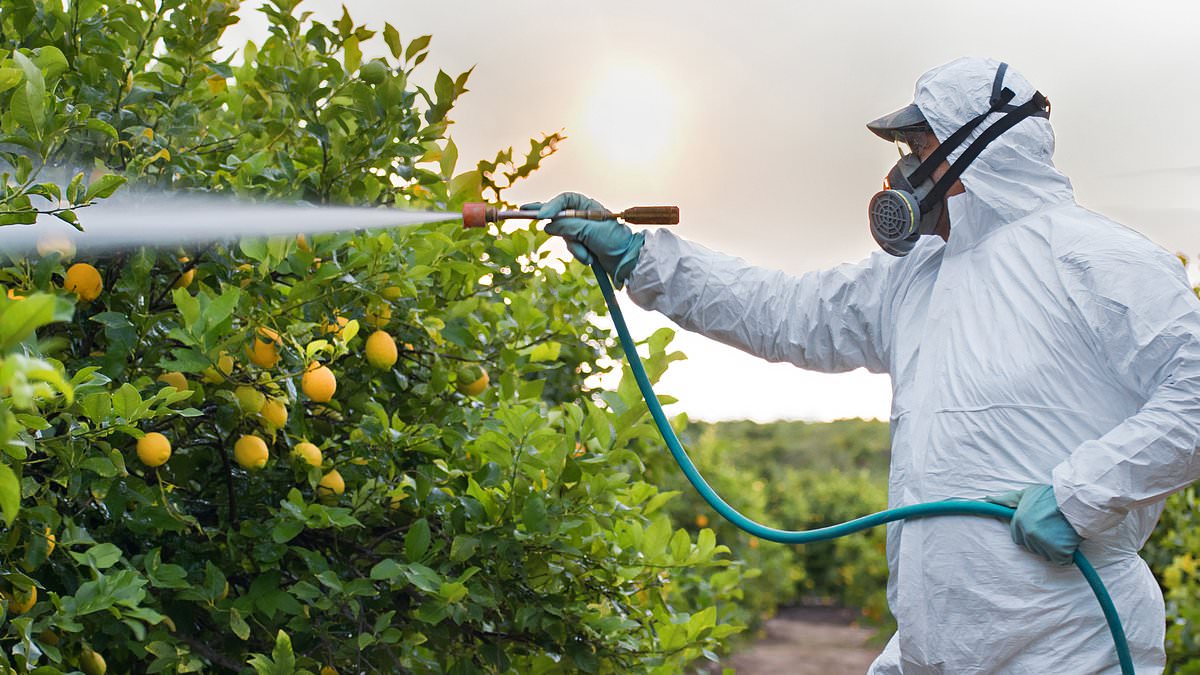Exposure to pesticides used in farming can cause as much harm to the body as smoking, a study suggests.
Researchers found common chemicals used to grow fruits and vegetables in the US were associated with higher levels of several cancers – including Hopkins lymphoma, leukemia, and bladder cancer – than smoking.
They estimated that pesticide use was linked to up to 150 percent more cancers in areas like the Midwest and Great Plains.
Strawberries, spinach, collard greens – typically thought of as some of the healthiest foods one can eat – have been named among produce with the most pesticides.
The researchers urged people to wash produce before eating to limit their consumption the amount of pesticides.
But other experts slammed the study’s findings, saying the way the data was calculated made it unreliable.

The following map shows the estimated additional cancer cases in over 3,000 US counties that can be attributed to pesticide use patterns. The Midwest and Great Plains regions showed the highest increases

Common pesticides such as glyphosate have been linked to developmental delays, blood cancer, organ damage, respiratory problems, ovarian and prostate cancers, and reproductive issues
‘This is the first study that presents comprehensive estimates for cases that are exclusively attributable to agricultural pesticide use,’ the researchers wrote.
Pesticides are a crucial facet of modern farming. They protect produce from bugs, ensuring that enough of the crop survives through the harvesting season.
But this also means that the chemicals remain on the produce that reaches people’s homes and leech into the water.
In addition to landing on fruits and vegetables that millions of people buy in grocery stores daily, pesticide runoff from irrigation and spraying the produce can contaminate water and soil nearby, polluting drinking water and other crops.
Some research indicates up to 80 percent of Americans have detectable levels of pesticides in their blood.
For the new study, researchers reviewed county-wide sales of 69 different pesticides from the US Geological Survey. ‘These data are the most extensive national pesticide data available,’ the team noted.
They compared this with regional cancer and smoking data from the CDC and NIH to estimate how many causes of cancer had been caused by agricultural chemicals.
The team used that data to evaluate rates per 100,000 people for all cancers, bladder cancer, colon cancer, leukemia, lung cancer, non-Hodgkin’s lymphoma, and pancreatic cancer.
The US researchers said that because more than one pesticide is often used at once, the cancer culprit is likely many of them used together in a ‘cocktail.’
Dr Isain Zapata, a professor at the Rocky Vista University College of Osteopathic Medicine in Colorado and co-author of the report, said: ‘It is difficult to explain the magnitude of an issue without presenting any context, so we incorporated smoking data. We were surprised to see estimates in similar ranges.’
Their findings were published in the journal Frontiers in Cancer Control and Society.

The largest pesticide-related cancer increases were seen in non-Hodgkin lymphoma, which contributed to 150 percent more cases than smoking

Colon cancer, which has surged in young Americans, also had 73 percent more cases related to pesticides than smoking
The new study included data from 3,143 counties across the US.
‘For all cancers, we observe the regions most affected by pesticide use are concentrated primarily in the Midwest but are spread out through the country with few areas spared,’ the team wrote.
‘Consistently, the most affected region across all cancers and by individual cancer types is the Midwest, a region characterized by heavy corn production.’
This region includes states like Iowa, Illinois, Nebraska, Missouri, Indiana, and Ohio.
In the Midwest, the researchers estimated that pesticides contributed to an additional 150,000 cases of all cancers. Additionally, in the Great Plains, Midwest, and Mississippi River Basin regions, the researchers observed nearly 21,000 added cases of colon cancer and 3,800 pancreatic cancer incidences.
‘Also, Florida, which is characterized by heavy agricultural production, unsurprisingly displays additional cancer risk,’ the team said.
The largest cancer increase from pesticides was for non-Hodgkin lymphoma, which saw 154 percent more cases compared to smoking. Bladder cancer had 19 percent more cases, while leukemia had 21 percent more.
For all cancers combined, pesticides were linked to 19 percent more cancers than smoking.
Meanwhile, smoking contributed to a 325 percent surge in lung cancer cases compared to pesticides, as smoking is the biggest contributor to this form of the disease. Pancreatic cancer was 3.4 percent greater for smoking than pesticides, and colon cancer was 73 percent greater.
‘In summary, agricultural pesticide use has a significant impact on all the cancer types evaluated in this study (all cancers, bladder cancer, colon cancer, leukemia, lung cancer, non-Hodgkin’s lymphoma, and pancreatic cancer), and these associations are more evident in regions with heavy agricultural productivity,’ the researchers wrote.
‘Pesticide-associated cancers appear to be on par with several smoking-associated cancer types.’

More than 90 percent of samples of strawberries, apples, cherries, spinach, nectarines and grapes had at least two pesticides on them, the EWG found
But Professor Bernard Stewart, from the University of New South Wales in Sydney, branded the research ‘nonsense’.
‘The study design cannot establish causation and no such modelling has been later confirmed for any putative carcinogen,’ he said.
‘The assertion that living in an environment heavily exposed to pesticides could increase the incidence of cancer as much as smoking is misleading.
‘Suggestions that pesticide exposure could play a role similar to smoking and be more determinative of cancer than socioeconomic disparities are without merit.’
Professor Terry Slevin, of the Australian National University, said there is growing evidence that pesticides are linked to cancer, but the study did not prove it.
‘There is little scientific evidence to support a claim that exposure to pesticides is contributing to the cancer burden to anything like the level attributable to tobacco smoking,’ he said.
‘Smokers are always well advised to quit, and non-smokers to not start smoking. People who use pesticides – especially those who do so regularly as part of their work – are strongly advised to minimise their exposure to those chemicals through finding alternatives, or by minimizing contact through proper PPE and careful handling.’
The relationship between cancer rates and pesticide use was highest in the Midwest, where corn production is a top earner for large swathes of the population.
The Environmental Working Group examines the uses of pesticides in fruits and vegetables and has reported that about 90 percent of samples of strawberries, apples, cherries, spinach, nectarines, and grapes tested positive for residues of two or more pesticides.


These maps show increases in bladder cancer and leukemia related to pesticides


These maps show increases in lung and pancreatic cancer related to pesticides
The EWG also reported finding 13 to 23 pesticides in at least one sample of each food item. Kale, collard and mustard greens had the most pesticides.
Dr Zapata said: ‘Every time I go to the supermarket to buy food, I think of a farmer who was part of making that product.
‘These people often put themselves at risk for my convenience and that plays a role in my appreciation for that product. It definitely has had an impact on how I feel when that forgotten tomato in the fridge goes bad and I have to put it in the trash.’
Some of the most common pesticides that ward off fungus and bugs have been linked to cancer, developmental delays, fertility problems, and hormone problems.
Though this is a first-of-its-kind study, other research has looked at health effects of specific pesticides.
One of the most famous pesticides is glyphosate, widely known by the brand name Roundup. A growing number of studies, including a major one from the University of Washington Department of Environmental and Occupational Health Sciences, have pointed to the cancer risks associated with Roundup.
Overall, the study found that the use of the herbicide increases the risk of non-Hodgkin lymphoma by 41 percent. Patterns between pesticide use and cancers like non-Hodgkin lymphoma and leukemia were most common in the Midwest and West Coast regions.
Another study published last year saw US doctors measure glyphosate levels in 268 farmers’ urine and signs of stress on cells. Higher levels of glyphosate were associated with more extensive stress on cells, also called oxidative stress, which can damage DNA and potentially cause cancer.
CDC reporting found that of 2,310 urine samples, meant to be representative of the US population, 80 percent were laced with glyphosate. About a third of those samples came from children aged six to 18.
However, the US Environmental Protection Agency maintains that there is ‘no evidence that glyphosate causes cancer in humans.’
The makers of Roundup—Monsanto and its owner Bayer AG—have repeatedly assured the public that their product is safe and does not pose a threat to human health.
Earlier this year, Pennsylvania groundskeeper John McKivison, 49, won a multi-billion-dollar lawsuit against Bayer after he had been diagnosed with non-Hodgkin’s lymphoma in 2020, which he and attorneys successfully argued was a result of using Roundup for two decades.
McKivison successfully argued that Monsanto and parent company Bayer were ‘negligent’ and ‘failed to warn about the dangers’ of its product.
Other common pesticides, such as Chlorpyrifos, Atrazine, Paraquat, and Carbaryl, have been linked to low IQ and developmental delays in children, reproductive issues and birth defects, organ damage, Parkinson’s, and cancers, including blood, breast, prostate, and ovarian cancers.
Some of the safest fruits and vegetables are the ones that have peels one typically removes before eating, such as avocados, sweet corn, and pineapple.









